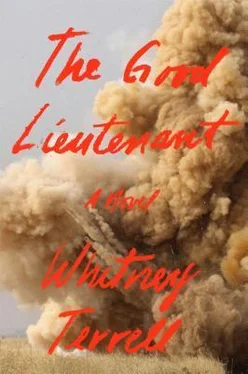“I think pathetic is a little strong.”
“But now I’m supposed to love them up and forget about anything I saw out there at the intersection. Just be a good soldier and roll on.”
Pulowski stiffened. Now she’d ruined it. “I gotta get going,” he said. “McKutcheon managed to get me on an early flight.”
“Are you punishing me?” she whispered in his ear. He had once told her that when he looked at the sky over Camp Tolerance, he saw ones and zeros. Signals, orders, satellite tracking, Wi-Fi, cellular communications, encrypted channels, tethered zephyrs that videoed the world beyond the wall, then beamed it back to someone’s desk. The point was to receive and interpret the signals clearly, not to fool yourself into imagining that you could affect them in any way. “Because if you really want to punish me, you ought to take me back to the trailer. Wouldn’t it be more interesting to do it there?”
“I said I’ve got a flight to catch.”
“Today?” They were tangled up, Pulowski trying to slide his legs out from under her. She held him with her thighs. “You didn’t tell me that. That’s not even fair.”
“You think it’s fair to ask me to be connected to this?”
Fowler glanced down at herself, rumpled ACU blouse, scuffed and faded knees on either side of Pulowski’s clean fabric. “I showered,” she said.
“Aw, Jesus fucking Christ.” Pulowski gave her his rat smile, upper teeth biting down on his lip. She sat beside him. The base spread out below them like an industrial resort, ranks of trailers like grubs, motor pools, junkyards. “Not you. This,” he said.
“You’re an Army officer, you dumbshit. You’re already fucking connected to this. What are you going to do, fly to Canada?”
“Canada’s in the coalition, you mope.”
There was a brief flash of humor there that she liked: Pulowski still had a little game. He turned to her and straightened out the collar of her blouse, so that the backs of his fingers touched her collarbone. It was more a fussy gesture than a loving one. Patronizing. She was frightened by how in control he seemed to be, by his lack of uncertainty. “You tell me what it was really like out there at Muthanna, picking up those pieces. It’s not just remains. Or that’s not the right word. There were dicks, right? I mean, there were actual physical dicks out there, right?”
“Come on, Pulowski. That’s wrong.”
“No, no, no — it’s exactly right. It is exactly accurate. You remember all the ladies running around kissing Mel Gibson’s ass in that movie Hartz showed us? Waiting around to get their death letters? I am not going to do that. I want to do things differently.” He paused as if he had something more to say, staring at her cockeyed, then stood up wearily and beat the dust off his pants. “I want to be alone when I come back.”
“All right,” she said. It was the opposite of what she meant.
“Fuck, yeah, it’s all right,” Pulowski said. “It’s perfectly fine. It’s me .”
* * *
The RG-31 was a specialized mine-clearing vehicle that the U.S. government had purchased from the South Africans for more than half a million a pop. There was a.50-cal on the roof, with a flared steel cowling around it, but its most important features, according to Colonel Seacourt’s PowerPoints, were the extra-wide, specially armored windows that would allow their soldiers to search for the culprits in the Muthanna bombing without having to dismount. To Fowler, it seemed the kind of strategy Pulowski would’ve liked. Separation. Distance. I’m not going to get involved . She was also curious how, given all those windows, this RG’s grille had become embedded in the mud wall of a canal off Route Serenade, a hundred meters from the main road. “Nice,” said Jimenez. “Man, shit, you’d think for the money they’d have some airbags in these things.”
“Or TV,” said Dykstra. “Huh? Nice fucking flat-screen.”
“Fuck the TV, man,” Beale said. “They need to get about four fifty-cals on this baby. Show the hadjis how we party.” The RG’s rear bumper was propped up on the near side of the canal and Beale dropped beneath the chassis, checked for wires, then chinned himself up into the RG’s cab, pants V’d with sweat, burrs cockling his pockets.
“Shut the fuck up, Beale,” Dykstra said.
“What, Jimenez gets to do jokes on airbags but I can’t say anything?” Beale said. “What’s that, a cultural thing?”
“It’s a shut-the-fuck-up thing,” Dykstra said.
“Guys,” Fowler said. And that ended it.
What she paid attention to instead — what she sensed, flowing alongside her anger and her impotence, calming it, easing it, compensating for it — were the motions of her platoon as they dispersed. She kept track of them like a melody, Waldorf across the canal to the northeast, Dykstra opposite him to the northwest, Jimenez behind them to the south, Crawford guarding the road, each of them concentrating his focus on the trees and grass and bean fields that stretched out from the RG on all sides. Even Beale, who — dick or not — she kept as close to her as possible, seemed to have things under control inside the RG. It was her first recovery mission since Pulowski had left, and she was happy to be away from the maintenance bay and her desk. Her platoon moved exactly as they’d practiced, just exactly according to the basic, simple rules for foot patrols that she herself had learned back in the woods around Fort Hays State: post security in all four ordinal directions, follow your team leader, do not speak. Not as good as sex, but definitely better than GoldenEye , or answering emails all goddamn day. So she noticed and secretly approved — and reminded herself to congratulate — the small hiss that Waldorf made across the ditch, and the response from Dykstra, which was to slowly, as if he’d sprung a leak, deflate himself into a prone position amid the thick bushy grass, each and every considered movement a redemption for the emptiness and confusion that had shamed and overtaken all of them, Fowler included, since they’d packed Fredrickson’s and Arthur’s body parts up at the intersection. To be involved in a battle in the proper way.
“I got something.” She could hear Beale banging around excitedly inside the RG. “There’s somebody down along the canal, north,” he said.
Canals were bad places for people to be, generally. Canals, especially dry ones, were where people hid to detonate IEDs. “How far away is he?”
“Hundred meters — he’s coming our direction, Lieutenant.”
Fowler was trying to imagine why an Iraqi would walk toward a patrol of U.S. soldiers down an empty canal, not hidden enough for an ambush, but not in the open enough to show he came in peace. It did not fit into any known categories of behavior. Or at least no category she’d been introduced to yet.
“Want me to take him?” Beale said.
“No, I want this motherfucker alive,” she said.
“He’s gonna be here soon,” Beale said after some delay.
“Don’t shoot,” Fowler hissed, climbing up on the roof of the truck.
There was something wrong with the whole setup. From the height of the RG’s roof, she could see the guy down in the ditch. A male, maybe twenty-five. He wore gray dress slacks with an elastic waistband and he was thin and his tan leather shoes were delicately pointed. She got her binoculars out and scanned the far side of the canal. There was a tree line about a hundred meters out. A house behind it.
“Everybody down in the canal,” she said. She got the glasses up. This time she saw movement, a filtering sensation behind the trees. She called to Beale through the opening in the RG’s roof, where the gunner would’ve stood. “Get around the bend,” she said. “All of you, go down the canal and get around the bend.”
Читать дальше












